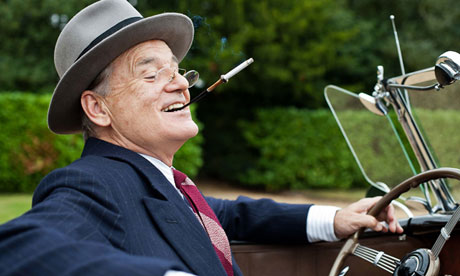
After the success of The King's Speech and the embarrassment of W.E., Albert and Elizabeth Windsor return to our screens once again in Hyde Park on Hudson (2012, Universal, 12). Samuel West and Olivia Colman fill the roles previously inhabited by Colin Firth and Helena Bonham Carter, here endeavouring to overcome their royal disdain for vulgarity and enjoy a hot-dog in order to cement the "special relationship" with America. The real draw, however, is Bill Murray as Roosevelt, courted by the Brits in the looming shadow of the second world war. Obsessed in equal measure by stamps and women, this FDR is a contradictory figure, seen through the eyes of his distant cousin Daisy (Laura Linney), whose company he craves and physical attentions he demands in darkly comic fashion. It's a peculiar film, notable for some tip-top performances and handsome production design, but hobbled by narrative uncertainties – the main storyteller comes and goes, her absence from large swaths of the drama rather undermining the supposed significance of her role. Murray does a convincing and heartfelt job of conveying both the frustrations and fortitude of the wheelchair-bound president, drawing on his own close family experience of polio to get the physical nuances just so. Hats off, too, to Olivias Colman and Williams as the real power behind the thrones – the brittle Elizabeth Windsor, and the imposing Eleanor Roosevelt – both of whom put their male counterparts to shame. Director Roger Michell takes pointed pleasure in depicting a world in which the public and private are entirely separate; a scene of photographers dutifully lowering their cameras when FDR is anything other than "on duty" strikes a particularly resonant note. A curate's egg then; oddly incidental, often frustrating, but occasionally enjoyable.
Great performances are also at the heart of The Sessions (2012, Fox, 15) for which Helen Hunt earned a deserved Oscar nomination as the sex surrogate called upon to help a severely debilitated man (John Hawkes) lose his virginity. Like the underrated Kinsey before it, this is an American movie with an admirably open and frank attitude toward sexuality – a quality that remains all too rare. Hunt and Hawkes are excellent as the teacher and pupil who find unexpected connections in apparently awkward circumstances, combining physical intimacy with professional "detachment" (the title refers to six strictly defined meetings) in a manner that bespeaks genuine affection. William H Macy makes a great fist of his role as the Catholic priest who decides that "God will give you a free pass on this one" – concluding that the elevation of the soul through a natural, healthy physical act outranks doctrine.
For the most extraordinary portrayal of the triumph of the human spirit over the limitations of the body, look no further than Planet of Snail (2011, Dogwoof, E), a brilliant documentary that was one of my favourite movies of last year. Rarely have we seen true love made more tangible and incarnate onscreen than in the relationship between Korean couple Young-Chan and Soon-Ho. He is deaf-blind; she is no taller than his waist; they communicate through tapping fingers, achieving a tactile connection closer than that which binds the titular mollusc to the world over which it moves. Together they explore the strange sensations of rain and the knotty furrows of trees, overcome almost insurmountable hurdles to perform "simple" domestic tasks (watching them change a lightbulb is more dramatic than you can possibly imagine), and write plays, prose and poetry that offer others an insight into their seemingly limitless world. If there's a film more deserving of the overused phrase "life-affirming", then I have yet to see it. An absolute joy.
From Japanese director Hirokazu Koreeda (After Life, Still Walking) comes I Wish (2011, Arrow, PG), the story of two brothers torn apart by their parents' separation who come to believe in a magical vortex created by the passing of the bullet trains that will connect their respective homes. Perfectly capturing the nature of pre-teen life in all its hopes, fears and aspirations (and without recourse to sentimentality), Koreeda makes splendid use of real-life brothers Ohshiro and Koki Maeda (who have performed together for several years), drawing beautifully natural and unaffected performances from these talented young actors. It's a richly rewarding film, the original Japanese title of which – Kiseki – translates appropriately as The Miracle.
From the sublime to the ridiculous, Gangster Squad (2013, Warner, 15) is a splashy style-over-substance "true story" mobster-romp that will have you longing for the depth, subtleties, and nuanced characters of computer game LA Noire. Indeed, having watched this, I'd like formally to apologise to Brian De Palma for ever calling some of his more visually overcooked work "empty". Sean Penn chews the scenery from behind a plastic nose, Ryan Gosling appears anaesthetised from the neck up, and the headachey atmosphere is less Chinatown than Chinese takeaway – all MSG, and no meat. Meanwhile, Arnie gets behind the Gatling gun once again for The Last Stand (2013, Lionsgate, 15) in which he plays an ageing sheriff manning the barricades to stop an escaped FBI prisoner making it to the border. It's nothing like as inventively deranged as director Kim Jee-woon's previous films, playing heavily upon the now familiar "geriaction" genre gag of having an old fart do something springy and then complain about their joints – not so much "I'll be back" as "Ooh, me back…"

